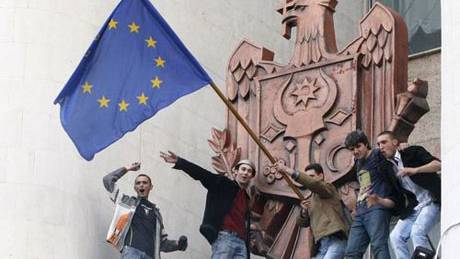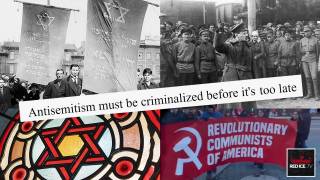Who is behind Moldova's Twitter Revolution?
Source: globalresearch.ca
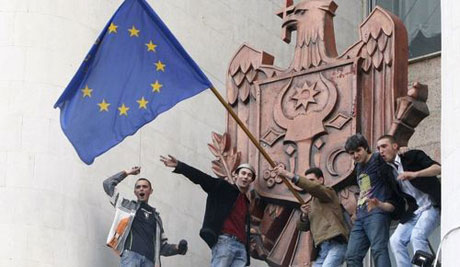
"A lot of what we [National Endowment for Democracy] do today was done covertly 25 years ago by the CIA." -Allen WeinsteinIt seems that those who anticipated the end of color revolutions have been proven wrong. So far, color revolutions have succeeded in Serbia, Georgia, Ukraine and Kyrgyzstan. On the other hand, they have failed in Belarus, Uzbekistan and Myanmar. Their common denominator is a wave of protests and sometimes riots whose purpose is to overthrow a local government, often held during electoral times or shortly afterwards. It has not gone unnoticed that the so called color revolutions have been backed (and engineered?) by enthusiastic western supporters including NGO's, diplomats, businessmen, governmental institutions and heads of state. In those countries where such political mobilizations have prevailed, pro-Western leaders have been enthroned as a result thereof. If one pays close attention to a map, it is impossible not to wonder if it is simply a coincidence that color revolutions have erupted in countries close to Russian and Chinese borders. It has to be pointed out that no color revolution has ever occurred in any country whose government is staunchly pro-Western.
Today, it is indeed quite likely that events taking place in Moldova are none other than the evident signs of the latest color revolution. Only a few days ago, elections were held there and the official announcement of preliminary results of the electoral process showed that the Party of Communists of the Republic of Moldova (affiliated to the Party of the European Left) had received nearly 50% of the votes. The Organization for Security and Co-operation in Europe (OSCE) certified that Moldovan parliamentary elections were free and fair. Nevertheless, protests attended by tens of thousands started shortly afterwards. However, these demonstrations can hardly be described as peaceful since media reports confirm that organized violence has targeted government facilities, including the parliament building as well as a presidential office. The script bears some similarities with Ukraine's Orange Revolution, which started with large protests demanding new elections once opposition politicians were discontent with electoral results.
It is telling that protestors have been photographed waving the flags of both Romania and the European Union. They have also requested the ouster of Moldova's current government, denouncing it as a "totalitarian regime" and demanded parliamentary elections to be re-scheduled. So far, Moldovan law enforcement has been overwhelmed and is unable to control these riots even though it has resorted to tear gas and water cannons. Moldovan senior government officials have stated that they regard these episodes of civil unrest as unlawful and that they will act accordingly. Furthermore, the Romanian ambassador in Moldova has been declared persona non grata and visa requirements for Romanian nationals have been established. Also, pro-Moldovan protesters rallies have taken place in many cities throughout Romania. Although no color has been chosen to name this color revolution, these events have already been termed as the Twitter Revolution because on-site reports indicate that protest organizers have made extensive use of social-networking tools in order to fuel discontent.
To determine whether or not any event is geopolitically significant, the timing is an element which always needs to be taken into account. The post Soviet space is one of the most active arenas of great power strategic competition and there are some meaningful recent precedents such as:
· The fact that Ukraine and Georgia have not been accepted as NATO members in spite of intense diplomatic pressure by prominent NATO members.The above demonstrates that the geopolitical rivalry between Russia and NATO has been intensifying. In fact, Russian senior politicians are already claiming that civil unrest in Moldova is been orchestrated by western intelligence survives. They have also emphasized that the ultimate goal is to accomplish regime change in Chiºinãu so NATO member Romania can swallow Moldova. It is no secret that hardline nationalists in Bucharest would like to achieve Anschluss with Moldova. Yet Western governments have refrained from voicing a strong support for the anti-government crowd in Moldova. However, it is necessary to explore what Western interests could consist of in this tiny post Soviet republic.
· Unlike other post Soviet states, Moldova's government had declared that Chiºinãu would remain neutral and that it would thus refuse to side with great powers, which more or less resembles the position taken by fellow former Soviet Republic Turkmenistan whose foreign policy must meet criteria of strict neutrality.
· The Russo-Georgian war in which Moscow inflicted a military defeat on strongly pro-Western Georgia.
· The announcement by the Kyrgyz government that the Manas air base will be closed.
· The European Union launched its Eastern Partnership project, designed by Poland and Sweden to reach out to Ukraine, Belarus, Azerbaijan, Georgia, Moldova and Armenia. This was seen in Moscow as an attempt to co-opt these countries and marginalize them away from Russian influence.
· Ukraine's decision to hold anticipated elections. It might be added that pro-Western Viktor Yuschchenko's candidacy does not look particularly promising.
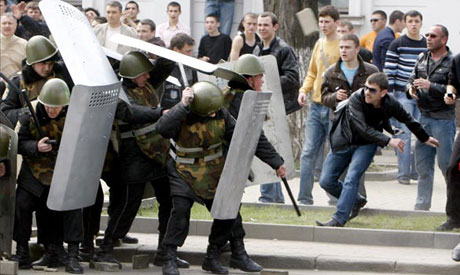
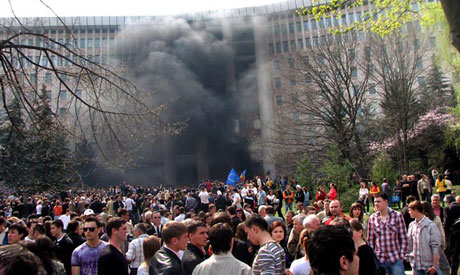
Why Moldova?
Moldova was one of the poorest and less developed republics of the Soviet Union, as well as the most densely populated. It is a landlocked country contiguous to Romania and Ukraine. Soviet planners had decided that Moldova would specialize in food production. Nevertheless, Moldova was not entirely homogeneous. The country's industrial infrastructure was built in Transnistria, a region mostly populated by people of Slavic ethnicity (i.e. Russians and Ukrainians). This region was responsible for a large of percentage of Moldova's GDP (40%) and it also contributed with almost the entire power generation of the Moldovan SSR. Toward the end of the Cold War, Romanian dictator Nicolae Ceauºescu had stated that the Kremlin had annexed Bessarabia (aka Moldova), which implied that he considered it as a part of Romania.
The disintegration of the Soviet Union changed little. The overall Moldovan economy is not specially outstanding since it exports wine, fruits and other beverages and food products. Moldova is a net importer of coal, oil and gas since if has no natural deposits of any of these resources. According to the CIA World Factbook, Moldova ranks 138th in a list of countries arranged by GDP.
Transnistria declared its independence from Moldova following the Soviet collapse because it was fearful of an increasingly nationalistic Moldova and the reemergence of pro-Romanian sentiment. This triggered a war between Chiºinãu and Transnistrian separatists. Russian forces were then deployed in order to end hostilities. The conflict has been frozen ever since. Nevertheless, the presence of Russian military personnel (which numbers nearly 3000) has allowed Transnistria to keep its de facto independence from Molvoda even though it still formally belongs to the latter. Indeed, Transnistria has its own authorities, military, law enforcement, currency, public services, flag, national anthem, constitution and coat of arms. Nearly half of Transnistrian exports are shipped to Russia.
Russia has supported Transnistria because it is inhabited by a considerable proportion of ethnic Russians loyal to Moscow; this must not be born in mind because people is Russia's scarcest resource. Furthermore, Transnistria is located in the easternmost region on Moldova and, more importantly, it borders Ukraine. Last but not least, Transnistria's small economy is based on heavy industry, textile production and power generation, which represents an additional atractive. As a result of Russian involvement, Chiºinãu has been careful not to be antagonistic toward Moscow.
Moldova's current president, Vladimir Voronin (the name can be misleading but he is, in fact, an ethnic Romanian), was elected in 2001 as the candidate of the Party of Communists of the Republic of Moldova. Regardless of his party's name, his administration can be described a pragmatic; for instance, he decided to continue privatization plans first put forward by his predecessor. Back in 2002, he angered nationalists by designating the Russian language as a second official language. Nevertheless, it would be a mistake to brand him as pro-Russian because his foreign policy has been seeking to balance Russian and Western interests without having to take sides. For example, his administration has expressed a desire to establish closer ties with the EU (which even runs a permanent mission in Chiºinãu) and cooperation with NATO and Russia, excluding membership in the Atlantic alliance or in the Russian-led CSTO. Furthermore, Voronin's government has stressed Moldova's need to preserve its independece instead of being absorbed by Romania. In short, he is neither pro-Russian (like Alexander Lukashenko) nor pro-Western (like Mikheil Saakashvili). Rather, his political position is closer to those of Ukraine's Kuchma, Georgia's Shevardnadze or even Turkmenistan's Niyazov and Berdymukhamedov.
Nonetheless, it is not far-fetched to assume that NATO in general and the US in particular are interested in regime change in Moldova. The main goal would be to overthrow the current Moldovan government and have it replaced by rulers more antagonistic toward Moscow. If such attempt succeeds, a new government in Moldova could be harangued into expelling Russian troops from Transnistria in an effort to rollback Russian military presence away from Eastern Europe, an effort meant to diminish Russian influence in the post Soviet space and to undermine Russia's prestige there and elsewhere. Moreover, it could be a Western reminder to Moscow that the slightest Russian distraction will be taken advantage of by NATO. A hypothetical pro-Western Moldova could even be later incorporated into NATO member Romania, moving the alliance borders eastward bypassing ordinary acceptance protocols for new members.
It remains to be seen if the Kremlin was caught by surprise and it is unclear how it will ultimately react to an eventual regime change in Chiºinãu, particularly if any new government attempts to take over Transnistria by force, much like Georgia did last year concerning South Ossetia. What is clear, however, is that Moscow does not want to be trapped into a conflict which could drain financial, military, diplomatic and political resources. Yet, Russian decision makers do not like what they are witnessing in Moldova; it is a script that had seen at play before. Therefore, it is reasonable to assert that Russia will resort to its intelligence assets it operates overseas in order to counter anti-Russian moves in Moldova before any deployment of troops is seriously considered. It is still too early to accurately foresee what defining developments will take place in Moldova and how they will unfold. If the current Moldovan government survives, the Twitter Revolution there could backfire. If that is indeed the case, Moldova's rulers could end up openly embracing Moscow as a result of real or alleged Western covert support for anti-government forces.
Russian accusations regarding the involvement of Western intelligence agencies has not been proved because all clandestine operations operate on the principle of plausible denial. Nonetheless, there are circumstantial facts which seem to demonstrate foreign intervention. For instance, some Western semi official institutions and NGO's openly acknowledged their activities in Moldova. For example:
· The USAID website concerning the agency's activities in Moldova mentions that some of them include "Moldova Citizen Participation Program", "Strengthening Democratic Political Activism in Moldova" and "Internet Access and Training Program". The latter is noteworthy because online social networks have been employed in order to increase anti-government activism. USAID's website specifies that "[its program] provides local communities with free access to the internet and to extensive training in all aspects of information technology". It goes on to explain that "Target groups include local government officials, journalists, students, local NGO representatives, professors and healthcare providers..."Those examples are particularly revealing if one takes into consideration that those organizations were prominent participants in previous color revolutions. That is, both the players and the Modus Operandi remains largely unchanged. A notorious protagonist and organizer of the Twitter Revolution is journalist Natalia Morar who used to work as press secretary for "The Other Russia", a strange coalition of anti-Putin political groups which encompasses hardline nationalists, communists and pro-Western activists.
In short, bearing in mind all of the above, it looks like a new episode of geopolitical confrontation between Russia and the West is unfolding in Moldova. This battle is not over yet and whatever its outcome turns out to be, its strategic implications will be deep because they will send strong shockwaves throughout Eastern Europe and the post Soviet space. The stakes are certainly being raised in this new round of the Great Game. A few years ago, notorious neocon pundit Charles Krauthammer observed that "This [Ukraine's Orange Revolution] is about Russia first, democracy second". The same phrase applies to Moldova's Twitter Revolution.
José Miguel Alonso Trabanco is an independent writer based in Mexico specialising in geopoltical and military affairs. He has a degree in International Relations from the Monterrey Institute of Technology and Higher Studies, Mexico City. His focus is on contemporary and historic geopolitics, the world's balance of power, the international system's architecture and the emergence of new powers.
Source: globalresearch.ca
For more on the revolutions in "Soviet Satellite states". Take a look at this: The Russian Godfathers - BBC (Video)
